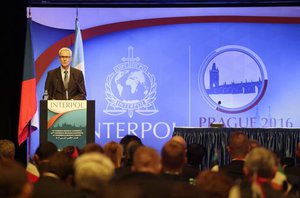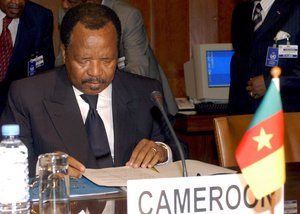- published: 01 Sep 2010
- views: 431758
-
remove the playlistAramaic
- remove the playlistAramaic
- published: 01 Oct 2016
- views: 125271
- published: 15 Dec 2008
- views: 361505
- published: 25 Sep 2014
- views: 32569
- published: 17 Jan 2013
- views: 177628
- published: 19 Aug 2010
- views: 265434
- published: 06 Oct 2016
- views: 20853

Aramaic language
Aramaic (Arāmāyā, Syriac: ܐܪܡܝܐ) is a family of languages or dialects belonging to the Semitic family. More specifically, it is part of the Northwest Semitic subfamily, which also includes Canaanite languages such as Hebrew and Phoenician. The Aramaic script was widely adopted for other languages and is ancestral to both the Arabic and modern Hebrew alphabets. Accordingly, Jesus Christ, the central figure of Christianity, spoke the Aramaic dialect during his public ministry.
During its approximately 3,000 years of written history, Aramaic has served variously as a language of administration of empires and as a language of divine worship. It became the lingua franca of the Neo-Assyrian Empire (911–605 BC), Neo-Babylonian Empire (605–539 BC), the Achaemenid Empire (539–323 BC), the Parthian Empire (247 BC–224 AD), and the Sasanian Empire (224–651), of the Neo-Assyrian states of Assur, Adiabene, Osroene and Hatra, the Aramean state of Palmyra, and the day-to-day language of Yehud Medinata and of Judaea (539 BC – 70 AD). It was the language that Jesus supposedly used the most, the language of large sections of the biblical books of Daniel and Ezra, as well as the main language of the Talmud. Aramaic was also the original language of the Bahrani people of Eastern Arabia, and of the Mandeans and their Gnostic religion, Mandeanism, as well as the language of the once widespread but now extinct Manichaean religion. The major Aramaic dialect Syriac is the liturgical language of Syriac Christianity, in particular the Church of the East, the Chaldean Catholic Church, the Saint Thomas Christian Churches in India, the Syriac Orthodox Church, the Assyrian Pentecostal Church, and the Maronite Church.
This article is licensed under the Creative Commons Attribution-ShareAlike 3.0 Unported License, which means that you can copy and modify it as long as the entire work (including additions) remains under this license.

Judeo-Aramaic languages
Judæo-Aramaic is a group of Hebrew-influenced Aramaic and Neo-Aramaic languages.
History
Early use
Aramaic, like Hebrew, is a Northwest Semitic language, and the two share many features. From the 7th century BCE, Aramaic became the lingua franca of the Middle East. It became the language of diplomacy and trade, but was not used by the Hebrew populace at this early date. As described in 2 Kings 18:26, the messengers of Hezekiah, king of Judah, demand to negotiate with Assyrian ambassadors in Aramaic rather than "Judean" (or "Judahite") so that the common people would not understand.
Gradual adoption
During the 6th century BCE, the Babylonian captivity brought the working language of Mesopotamia much more into the daily life of ordinary Jews. Around 500 BCE, Darius I of Persia proclaimed that Aramaic would be the official language for the western half of his empire, and the Eastern Aramaic dialect of Babylon became the official standard. In 1955, Richard Frye questioned the classification of Imperial Aramaic as an "official language", noting that no surviving edict expressly and unambiguously accorded that status to any particular language.
This article is licensed under the Creative Commons Attribution-ShareAlike 3.0 Unported License, which means that you can copy and modify it as long as the entire work (including additions) remains under this license.

Lord's Prayer
The Lord's Prayer, also called the Our Father and the Pater Noster, is a venerated Christian prayer that, according to the New Testament, was taught by Jesus to his disciples. Two forms of it are recorded in the New Testament: a longer form in the Gospel of Matthew as part of the Sermon on the Mount, and a shorter form in the Gospel of Luke as a response by Jesus to a request by "one of his disciples" to teach them "to pray as John taught his disciples" concludes with "deliver us from evil" in Matthew, and with "lead us not into temptation" in Luke. The first three of the seven petitions in Matthew address God; the other four are related to human needs and concerns. The liturgical form is the Matthean. Some Christians, particularly Protestants, conclude the prayer with a doxology, a later addendum appearing in some manuscripts of Matthew.
The context of the prayer in Matthew is a discourse deploring people who pray ostentatiously.
In biblical criticism, the prayer's absence in the Gospel of Mark together with its occurrence in Matthew and Luke has caused scholars who accept the two-source hypothesis (against other document hypotheses) to conclude that it is probably a logion original to Q.
This article is licensed under the Creative Commons Attribution-ShareAlike 3.0 Unported License, which means that you can copy and modify it as long as the entire work (including additions) remains under this license.
Our Father
Our Father may refer to:
See also
This article is licensed under the Creative Commons Attribution-ShareAlike 3.0 Unported License, which means that you can copy and modify it as long as the entire work (including additions) remains under this license.

The Passion television franchise
The Passion is a huge passion play, held around Easter on the streets of a certain city. The event started in the Netherlands as a collaboration between the broadcasters EO and RKK (nowadays between EO and KRO-NCRV) and the local community. In 2016 an American version will be staged in New Orleans. The event is considered a missionary chance to pay attention to Easter.
Creation
The event and television is partly inspired by the local event, the Manchester Passion, held and broadcast by BBC Three on Good Friday. The production company Eye2Eye Media brought the event to the Netherlands. The first Dutch version was on Maundy Thursday in 2011 held at the market square in Gouda with a live-broadcast on TV. It proved successful and new editions followed in the next years.
Later on, other countries like Belgium (2014) and the United States (2016) followed with local versions of the event.
Feature
Structure
The event is staged in a main square in a city around Easter.
This article is licensed under the Creative Commons Attribution-ShareAlike 3.0 Unported License, which means that you can copy and modify it as long as the entire work (including additions) remains under this license.
- Loading...

-
 4:21
4:21Lord's Prayer (Aramaic)
Lord's Prayer (Aramaic) -
 5:07
5:07Ths Psalm performed in Aramaic during Pope Francis' visit to Georgia
Ths Psalm performed in Aramaic during Pope Francis' visit to GeorgiaThs Psalm performed in Aramaic during Pope Francis' visit to Georgia
Father Seraphim and his choir his choir from Georgia chanting the Psalm 53 in Aramaic.durign the visit of Pope Francis to Georgia, 30 September 2016. მამა სერაფიმეს გალობა არამეულ ენაზე @პირველი არხი -
 7:20
7:20Is the language of Jesus Christ endangered?
Is the language of Jesus Christ endangered?Is the language of Jesus Christ endangered?
Aramaic, 2008 - Syria - The language Jesus Christ is supposed to have spoken, Aramaic, is used less and less in the modern world, this community are trying to keep it alive. For downloads and more information visit: http://www.journeyman.tv/59268/short-films/aramaic.html In a remote village nestled in Syrias picturesque Oalamoun mountains, resides a small Aramaic community. It is one of the last and it is devoted to preserving Aramaic: the language that Jesus spoke. Protecting this 3000-year-old language has united Malulas residents: Christians and Muslims are like brothers in this town, says local resident Ibrahim Kamar. Whilst Mel Gibsons The Passion of Christ has revived interest in the language, fears that Aramaic is dying out continue. Malula, where the orphans must recite in Aramaic, is one of the last bastions for a language Mother Superior Savaf describes as a gift from God. Produced by ABC Australia. Ref - 4251 Journeyman Pictures is your independent source for the world's most powerful films, exploring the burning issues of today. We represent stories from the world's top producers, with brand new content coming in all the time. On our channel you'll find outstanding and controversial journalism covering any global subject you can imagine wanting to know about. -
 14:20
14:20Aramaic Interview with Fr Brutos Bethlehem, Syrian Orthodox Church Virgin Mary
Aramaic Interview with Fr Brutos Bethlehem, Syrian Orthodox Church Virgin MaryAramaic Interview with Fr Brutos Bethlehem, Syrian Orthodox Church Virgin Mary
Directed By: John-Roger, Dss & Jsu Garcia, Dss Aramaic (Classical Syriac: ܐܪܡܝܐ Aramaya) is a family of languages or dialects, belonging to the Semitic family. More specifically, it is a part of the Northwest Semitic subfamily, which also includes Canaanite languages such as Hebrew and Phoenician. The Aramaic script was widely adopted for other languages and is ancestral to both the Arabic and modern Hebrew alphabets. During its over 3,000 years of written history,[2] Aramaic has served variously as a language of administration of empires and as a language of divine worship. It was the lingua franca of the Neo-Assyrian Empire, Neo-Babylonian Empire and Achaemenid Empire, the day-to-day language of Yehud Medinata and of Judaea (539 BC – 70 AD), the language that Jesus probably used the most,[3][4][5] the language of large sections of the biblical books of Daniel and Ezra, and is the main language of the Talmud and Syriac Christianity, in particular the Assyrian Church of the East, the Chaldean Catholic Church, the Ancient Church of the East, the Saint Thomas Christian Churches in India, the Syriac Orthodox Church and the Maronite Church.[6] However, Jewish Aramaic was different from the other forms both in lettering and grammar. Parts of the Dead Sea Scrolls are in Jewish Aramaic showing the Jewish lettering, related to the Hebrew script. Aramaic was also the original language of the Bahrani people of Eastern Arabia.[7] Aramaic's long history and diverse and widespread use has led to the development of many divergent varieties, which are sometimes considered dialects, though they are distinct enough that they are sometimes considered languages. Therefore, there is not one singular, static Aramaic language; each time and place rather has had its own variation. Aramaic is retained as a liturgical language by certain Eastern Christian churches, in the form of Syriac, the Aramaic variety by which Eastern Christianity was diffused, whether or not those communities once spoke it or another form of Aramaic as their vernacular, but have since shifted to another language as their primary community language. Modern Aramaic is spoken today as a first language by many scattered, predominantly small, and largely isolated communities of differing Christian, Jewish, and Mandean ethnic groups of West Asia[8]—most numerously by the Assyrians in the form of Assyrian Neo-Aramaic and Chaldean Neo-Aramaic—that have all retained use of the once dominant lingua franca despite subsequent language shifts experienced throughout the Middle East. The Aramaic languages are now considered endangered.[9] -
 3:21
3:21The Lord's Prayer in Aramaic
The Lord's Prayer in AramaicThe Lord's Prayer in Aramaic
Discover and learn the Lord's Prayer in it's original Aramaic version, the language that Jeshua (Jesus) spoke. Aramaic is a language of vibration, and the prayer is a practice of attuning to the divine, becoming one with the source of all creation. It is an extraordinary practice for personal transformation! This video has been created using audio from Jayem's "Recline in My Beloved" CD. You can visit our website to find out more about the prayer, and download a printed version of the words and their translation: http://www.wayofmastery.com/pathway/the_aramaic_jesus/3248.html Or visit our facebook page here: https://www.facebook.com/aramaiclordsprayer -
 10:58
10:58The Original Our Father in Jewish Aramaic.
The Original Our Father in Jewish Aramaic.The Original Our Father in Jewish Aramaic.
The book 'The Original Our Father in Aramaic - A New Discovery' will be published in a few months time. It tells the story of the reconstruction of the prayer in Jewish Aramaic, and gives a completely Jewish understanding of the prayer by placing it into its historical Jewish context. For updates on this, follow us on Facebook http://www.facebook.com/home.php?ref=home#!/home.php?sk=group_154094964656044 For more information on Talmidaism (modern 'Jewish-Christianity'), go to: http://www.talmidi.co.il/ If you have any questions, or require information, please email: talmidi@hotmail.com The 'Abbun d'bishmayya': A short talk on the 'Our Father' (Lord's Prayer) in Jewish Aramaic, the form it is said within the Talmidi Jewish community. abbun d'bishmayya, yitqadesh sh'makh! titey malkhutakh; tihey re`utakh - heykhma d'bishmayya, keyn af be'ar`a. lachman d'me'ar`a, hab lan yoma deyn umachra. ushbaq lan chobayn, heykma d'af sh'baqnan l'chayyabayn. ve'al ta`eylan l'nisayuna, ela atseylan min bisha Our Father, who is in heaven, Sanctified be Your Name; May Your Kingdom be fulfilled; May Your will be realised - Just as it is in heaven, So also upon the earth. Our bread, which is from the earth, Give us day by day. And forgive us our sins, Just as we should forgive our debtors. And do not bring us to trial, Rather deliver us from evil. The prayer is a reconstruction of what the prayer might have been in Jewish Aramaic, since we no longer have the actual prayer as spoken by the prophet Yeshua`. -
 5:18
5:18The Passion of the Christ: Pharisees condemn Jesus (Aramaic)
The Passion of the Christ: Pharisees condemn Jesus (Aramaic)The Passion of the Christ: Pharisees condemn Jesus (Aramaic)
From The Passion of the Christ -
 5:07
5:07მამა სერაფიმეს გალობა არამეულ ენაზე / Chant in Aramiac language (Father Seraphime)
მამა სერაფიმეს გალობა არამეულ ენაზე / Chant in Aramiac language (Father Seraphime)მამა სერაფიმეს გალობა არამეულ ენაზე / Chant in Aramiac language (Father Seraphime)
Песнопение Отца Серафима на Арамейском языке. -
![[Aramaic] Psalm 53 in Georgia (for pope Francis) - REMASTERED; updated 06 Oct 2016; published 06 Oct 2016](http://web.archive.org./web/20161212234221im_/https://i.ytimg.com/vi/Xq3UX8yIBZI/0.jpg) 5:07
5:07[Aramaic] Psalm 53 in Georgia (for pope Francis) - REMASTERED
[Aramaic] Psalm 53 in Georgia (for pope Francis) - REMASTERED[Aramaic] Psalm 53 in Georgia (for pope Francis) - REMASTERED
I remastered the sound of the video. I'm pretty sure you're gonna enjoy this version. -
 6:49
6:49The Word _Allah_ - in Arabic, Hebrew and Aramaic, by a Jewish Scholar.mp4
The Word _Allah_ - in Arabic, Hebrew and Aramaic, by a Jewish Scholar.mp4The Word _Allah_ - in Arabic, Hebrew and Aramaic, by a Jewish Scholar.mp4
A Jewish Scholar offers evidence to prove that Allah is the name of God in Hebrew, Aramaic and Arabic. I am posting this to prove the FALSE right-wing Evangelical who are attempting so hard to distance Christianity & Judaism from Islam. But facts will remain facts
-

-

Ths Psalm performed in Aramaic during Pope Francis' visit to Georgia
Father Seraphim and his choir his choir from Georgia chanting the Psalm 53 in Aramaic.durign the visit of Pope Francis to Georgia, 30 September 2016. მამა სერაფიმეს გალობა არამეულ ენაზე @პირველი არხი
published: 01 Oct 2016 -

Is the language of Jesus Christ endangered?
Aramaic, 2008 - Syria - The language Jesus Christ is supposed to have spoken, Aramaic, is used less and less in the modern world, this community are trying to keep it alive. For downloads and more information visit: http://www.journeyman.tv/59268/short-films/aramaic.html In a remote village nestled in Syrias picturesque Oalamoun mountains, resides a small Aramaic community. It is one of the last and it is devoted to preserving Aramaic: the language that Jesus spoke. Protecting this 3000-year-old language has united Malulas residents: Christians and Muslims are like brothers in this town, says local resident Ibrahim Kamar. Whilst Mel Gibsons The Passion of Christ has revived interest in the language, fears that Aramaic is dying out continue. Malula, where the orphans must recite in Aram...
published: 15 Dec 2008 -

Aramaic Interview with Fr Brutos Bethlehem, Syrian Orthodox Church Virgin Mary
Directed By: John-Roger, Dss & Jsu Garcia, Dss Aramaic (Classical Syriac: ܐܪܡܝܐ Aramaya) is a family of languages or dialects, belonging to the Semitic family. More specifically, it is a part of the Northwest Semitic subfamily, which also includes Canaanite languages such as Hebrew and Phoenician. The Aramaic script was widely adopted for other languages and is ancestral to both the Arabic and modern Hebrew alphabets. During its over 3,000 years of written history,[2] Aramaic has served variously as a language of administration of empires and as a language of divine worship. It was the lingua franca of the Neo-Assyrian Empire, Neo-Babylonian Empire and Achaemenid Empire, the day-to-day language of Yehud Medinata and of Judaea (539 BC – 70 AD), the language that Jesus probably used the m...
published: 25 Sep 2014 -

The Lord's Prayer in Aramaic
Discover and learn the Lord's Prayer in it's original Aramaic version, the language that Jeshua (Jesus) spoke. Aramaic is a language of vibration, and the prayer is a practice of attuning to the divine, becoming one with the source of all creation. It is an extraordinary practice for personal transformation! This video has been created using audio from Jayem's "Recline in My Beloved" CD. You can visit our website to find out more about the prayer, and download a printed version of the words and their translation: http://www.wayofmastery.com/pathway/the_aramaic_jesus/3248.html Or visit our facebook page here: https://www.facebook.com/aramaiclordsprayer
published: 17 Jan 2013 -

The Original Our Father in Jewish Aramaic.
The book 'The Original Our Father in Aramaic - A New Discovery' will be published in a few months time. It tells the story of the reconstruction of the prayer in Jewish Aramaic, and gives a completely Jewish understanding of the prayer by placing it into its historical Jewish context. For updates on this, follow us on Facebook http://www.facebook.com/home.php?ref=home#!/home.php?sk=group_154094964656044 For more information on Talmidaism (modern 'Jewish-Christianity'), go to: http://www.talmidi.co.il/ If you have any questions, or require information, please email: talmidi@hotmail.com The 'Abbun d'bishmayya': A short talk on the 'Our Father' (Lord's Prayer) in Jewish Aramaic, the form it is said within the Talmidi Jewish community. abbun d'bishmayya, yitqadesh sh'makh! titey m...
published: 19 Aug 2010 -

The Passion of the Christ: Pharisees condemn Jesus (Aramaic)
From The Passion of the Christ
published: 20 Sep 2009 -

მამა სერაფიმეს გალობა არამეულ ენაზე / Chant in Aramiac language (Father Seraphime)
Песнопение Отца Серафима на Арамейском языке.
published: 01 Oct 2016 -

[Aramaic] Psalm 53 in Georgia (for pope Francis) - REMASTERED
I remastered the sound of the video. I'm pretty sure you're gonna enjoy this version.
published: 06 Oct 2016 -

The Word _Allah_ - in Arabic, Hebrew and Aramaic, by a Jewish Scholar.mp4
A Jewish Scholar offers evidence to prove that Allah is the name of God in Hebrew, Aramaic and Arabic. I am posting this to prove the FALSE right-wing Evangelical who are attempting so hard to distance Christianity & Judaism from Islam. But facts will remain facts
published: 28 Mar 2010
Lord's Prayer (Aramaic)
- Order: Reorder
- Duration: 4:21
- Updated: 01 Sep 2010
- views: 431758
Ths Psalm performed in Aramaic during Pope Francis' visit to Georgia
- Order: Reorder
- Duration: 5:07
- Updated: 01 Oct 2016
- views: 125271
- published: 01 Oct 2016
- views: 125271
Is the language of Jesus Christ endangered?
- Order: Reorder
- Duration: 7:20
- Updated: 15 Dec 2008
- views: 361505
- published: 15 Dec 2008
- views: 361505
Aramaic Interview with Fr Brutos Bethlehem, Syrian Orthodox Church Virgin Mary
- Order: Reorder
- Duration: 14:20
- Updated: 25 Sep 2014
- views: 32569
- published: 25 Sep 2014
- views: 32569
The Lord's Prayer in Aramaic
- Order: Reorder
- Duration: 3:21
- Updated: 17 Jan 2013
- views: 177628
- published: 17 Jan 2013
- views: 177628
The Original Our Father in Jewish Aramaic.
- Order: Reorder
- Duration: 10:58
- Updated: 19 Aug 2010
- views: 265434
- published: 19 Aug 2010
- views: 265434
The Passion of the Christ: Pharisees condemn Jesus (Aramaic)
- Order: Reorder
- Duration: 5:18
- Updated: 20 Sep 2009
- views: 134029
მამა სერაფიმეს გალობა არამეულ ენაზე / Chant in Aramiac language (Father Seraphime)
- Order: Reorder
- Duration: 5:07
- Updated: 01 Oct 2016
- views: 191559
- published: 01 Oct 2016
- views: 191559
[Aramaic] Psalm 53 in Georgia (for pope Francis) - REMASTERED
- Order: Reorder
- Duration: 5:07
- Updated: 06 Oct 2016
- views: 20853
- published: 06 Oct 2016
- views: 20853
The Word _Allah_ - in Arabic, Hebrew and Aramaic, by a Jewish Scholar.mp4
- Order: Reorder
- Duration: 6:49
- Updated: 28 Mar 2010
- views: 8535
- Playlist
- Chat
- Playlist
- Chat

Lord's Prayer (Aramaic)
- Report rights infringement
- published: 01 Sep 2010
- views: 431758

Ths Psalm performed in Aramaic during Pope Francis' visit to Georgia
- Report rights infringement
- published: 01 Oct 2016
- views: 125271

Is the language of Jesus Christ endangered?
- Report rights infringement
- published: 15 Dec 2008
- views: 361505

Aramaic Interview with Fr Brutos Bethlehem, Syrian Orthodox Church Virgin Mary
- Report rights infringement
- published: 25 Sep 2014
- views: 32569

The Lord's Prayer in Aramaic
- Report rights infringement
- published: 17 Jan 2013
- views: 177628

The Original Our Father in Jewish Aramaic.
- Report rights infringement
- published: 19 Aug 2010
- views: 265434

The Passion of the Christ: Pharisees condemn Jesus (Aramaic)
- Report rights infringement
- published: 20 Sep 2009
- views: 134029

მამა სერაფიმეს გალობა არამეულ ენაზე / Chant in Aramiac language (Father Seraphime)
- Report rights infringement
- published: 01 Oct 2016
- views: 191559

[Aramaic] Psalm 53 in Georgia (for pope Francis) - REMASTERED
- Report rights infringement
- published: 06 Oct 2016
- views: 20853

The Word _Allah_ - in Arabic, Hebrew and Aramaic, by a Jewish Scholar.mp4
- Report rights infringement
- published: 28 Mar 2010
- views: 8535
-
Lyrics list:lyrics
-
Yurameki, Dir En Grey
-
Armagh, Au Pairs
Yurameki
kaerenakute wasuretakute
"yurameku" koto no nai ai wo kimi ni
nakikuzureru kimi wo mitsume
mou imasara boku ni nani ga dekiru no ka
itsumo yori tsuyoku dakishimeta ne
ano hi kimi no hitomi kara boku wa kieteita
ima ni natte kizuku nante...
demo kimi wa kawaranai kimi no ai wa mou nai no
kimi wo hontou ni baka da yo boku
kimi no koto wo omou to nazeka namida ga nagareteta
kore de owari ni shiyou ka?
dakara ima made no you itsumo kimi wo dakishimetai
Download MP3's
kimi wo kizu tsukeru nante nido to nai
ai wo uragirisugita ne boku wa...
naze futari wa deatta no kimi ni nani wo nokoseta no?
[mou sannen mae ni wa modorenai no ima wa...]
kaeranakute wasuretakute
mata futari wa deaetara sore made machitsuzukeru yo
eien ni ima made ijou ni nai ai wo
ima made ijou ni mou ichido omoide sae wasuretakute
ai shita kokoro ga itakute
ai yori haruka ni omoi uragiri no naka de
Japan protests after China slams dangerous mid-air confrontation
Edit CNN 12 Dec 2016French Manhunt Unleashed For 4 Men Suspected Of Stealing 1.5M Euros Of Gold Dust
Edit WorldNews.com 12 Dec 2016What Does Civil Disobedience Look Like In A State-Controlled Information Age?
Edit WorldNews.com 12 Dec 2016This Breathtaking Video Reveals How Humanity Took Over The World
Edit IFL Science 12 Dec 2016Priest tells of anguish giving last rites to dying crash victim Ryan McCaul
Edit Belfast Telegraph 10 Dec 2016The Visage of Prophet Mohammad (Pbuh)
Edit Kashmir Observer 09 Dec 2016Ransomed: The freeing of 226 Christians from the Islamic State
Edit Rocky Mount Telegram 09 Dec 2016Chance to save ancient language
Edit Kathimerini 07 Dec 2016Mel Gibson on 'Hacksaw Ridge' and faith: "I’m imperfect. I’ll sort my stuff out."
Edit Screen Daily 07 Dec 2016Mel Gibson on 'Hacksaw Ridge' and faith: "I’ll sort my stuff out, maybe in private"
Edit Screen Daily 07 Dec 2016Cyprus minority sees chance to save ancient language
Edit Topix 06 Dec 2016Ransomed — The freeing of 226 Christians from Islamic State
Edit Jamaica Observer 06 Dec 2016Ransomed: The freeing of 226 Christians from Islamic State
Edit Philadelphia Daily News 06 Dec 2016The Syrian bishop who saved 226 Christian hostages from Isis
Edit The Independent 06 Dec 2016Ransomed: The race to free 226 Christian hostages in Syria
Edit Albuquerque Journal 06 Dec 2016Ransomed: the race to free 226 Assyrian Christian hostages in Syria
Edit The National 06 Dec 2016Partnership Fund Board Chair and Maori representative announced (New Zealand Government)
Edit Public Technologies 05 Dec 2016- 1
- 2
- 3
- 4
- 5
- Next page »








